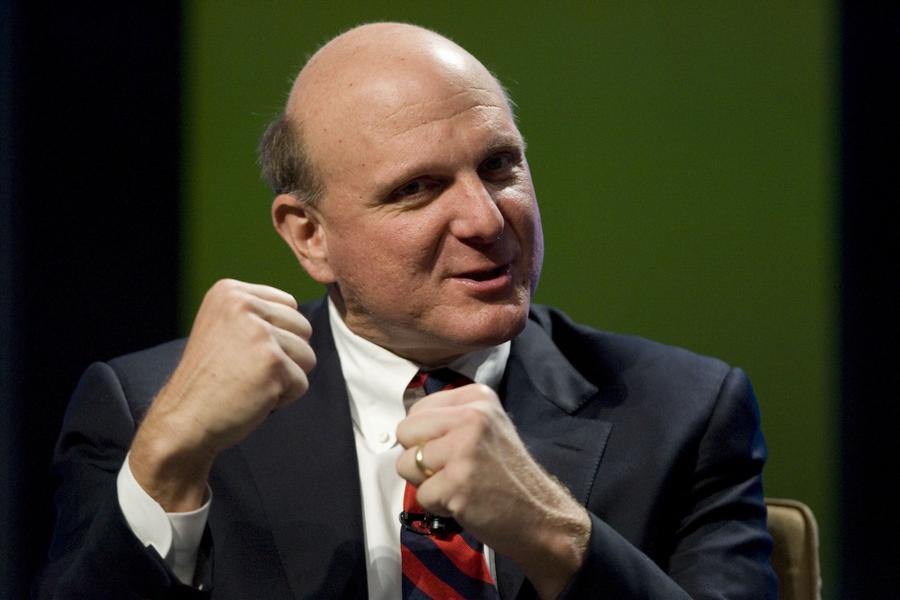Today, Steve Ballmer is a billionaire and owner of the NBA's Los Angeles Clippers with a net worth of $28.5 billion. But back when the now 62-year-old was 24, he dropped out of the MBA program at Stanford to take a job at his former Harvard classmate Bill Gates' new company Microsoft. It was a gamble that clearly paid off, but not before it totally scared his parents. After all, he had an undergrad degree from Harvard, was getting his MBA at Stanford, and was throwing it all away to take a $50,000 a year job as an assistant.
Ballmer was no dummy. He saw an opportunity and grabbed it. Plus, he was a smarty pants. He was the valedictorian of his high school class and graduated from Harvard magna cum laude. After college he worked at Proctor and Gamble as an assistant product manager for two years. Then he enrolled at Stanford to pursue his MBA. Less than a year into the program, he left to join Microsoft.

Kimberly White/Getty Images
His dad didn't get it. His mom didn't get it. His dad wanted to know what software was. His mom didn't see why anyone would ever need a computer. They wanted to be reassured that if his newfangled job at this tech startup they didn't understand did not work out that he'd go back and finish his MBA. Steve assured him that he would. Of course, he never did.
Ballmer started off as the assistant to the president. He was Bill Gates' assistant. He set up the accounting department to be more professional. He was HR and hired everybody. For this, he was paid $50,000 and also received 5 to 10% equity in Microsoft and 10% of the profit growth he generated.
When Ballmer joined Microsoft, Gates was doing everything from coding the software to hiring employees because he would not delegate. By bringing in his college friend, he was able to let go of some of that workload and in time Ballmer taught him how to hire people rapidly and create teams and organizations.
Ballmer made himself indispensable in 1980 when he played a key role in Microsoft's negotiations with IBM. The venerable computer giant had approached Microsoft with an idea to make computers available to everyday people and wanted Gates' company's help. Ballmer closed the deal with IBM to run Microsoft's software on their new personal computers. After that, Ballmer quickly rose through the ranks at Microsoft until 1998, when Gates asked Ballmer to be president of the software giant. In 2000, he became CEO of Microsoft. Ballmer was integral in leading the company through their anti-trust legal battle, the dot-com bubble, and the launch of Xbox, acquisition of Skype, and creation of Microsoft's $20 billion enterprise business.
Ballmer led Microsoft for almost 15 years when he retired. He stepped down as CEO in 2014. He retained his 4% state in the company, which is a considerable contributor to his fortune. He is also Microsoft's largest individual shareholder.
/2021/07/Steve-Ballmer.jpg)
/2015/08/GettyImages-453787406.jpg)
/2022/10/GettyImages-1187708883.jpg)
/2016/02/GettyImages-494885346.jpg)
/2014/05/GettyImages-57107187.jpg)
/2018/11/GettyImages-1056086398.jpg)
/2010/11/josh.jpg)
/2023/10/elaine-wynn.jpg)
/2021/10/John-Boyega.jpg)
:strip_exif()/2020/06/taylor.png)
/2020/10/cate.jpg)
/2010/11/russell-armstrong.png)
/2021/04/William-Levy-1.jpg)
/2014/05/Daisy-Ridley.jpg)
/2020/03/steve-wynn.jpg)
/2018/04/GettyImages-942450576.jpg)
/2013/07/courtney-henggeler.jpg)
/2022/05/Nayib-Bukele.jpg)
/2010/03/nc.jpg)
/2021/11/rich-vos.jpg)
/2012/08/broner.jpg)
/2014/06/oscar.jpg)
/2010/05/Lenny-Kravitz-1.jpg)